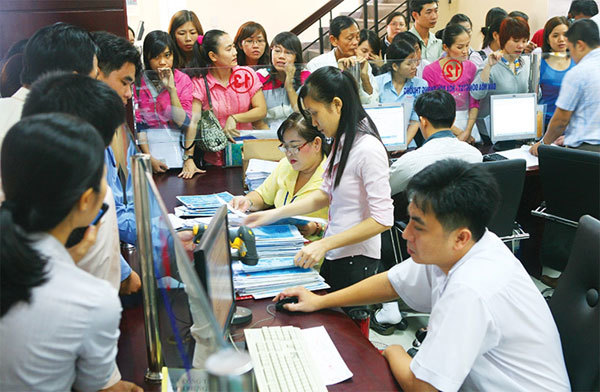for Vietnam to improve its competitiveness.
 |
| A stronger business environment with fewer time-consuming processes can spur on investment and even create jobs. |
Over the past few years, privately-owned Anh Do Agricultural Services and Trading Co., Ltd. in Hanoi has found it more favourable to do business on the back of the government’s annual Resolution 19 on improving the local business climate and enhancing national competitiveness.
“The time it has taken us to conduct import and export procedures has reduced by about 30 per cent, but we still have to pay much money and spend much time conducting not only those procedures, but also many others,” said company director Trinh Tu Anh.
Like thousands of businesses in Vietnam, Anh Do is now tormented by customs procedures. “We have completed all e-customs procedures, but we are still required to submit many types of paper-based documents which need inking by the business’ leader,” Anh said. “The problem is that while businesses are required to declare procedures online, they still have to submit such documents physically. Thus the online declaration has become meaningless.”
At last week’s press conference on announcing the programme on abolishing and simplifying business regulations in the 2020-2025 period as regulated in May’s government Resolution No.68/NQ-CP, Minister, Chairman of the Government Office Mai Tien Dung stated that such a situation facing companies like Anh Do is currently still commonly seen in many localities.
“Though having been reduced and simplified significantly, many regulations troubling enterprises and the public remain. In many localities and ministries, when a regulation is cut, another more complicated one is created, driving enterprises into more difficulties,” Dung said.
Waves of reforms
According to the prime minister’s Advisory Council for Administrative Procedure Reform (ACAPR), Vietnam has been undergoing three large-scale administrative reform waves in the government’s current tenure.
The first one, from 2007 to 2011, saw the review and publication of over 6,000 administrative procedures, with a reduction of $1.6 billion a year in cost for obeying them. This wave was implemented under the prime minister’s Decision No.30/QD-TTg issued in 2007 on simplifying administrative procedures in state management sectors for 2007-2010.
The second wave, from 2016 to August 2020, witnessed the removal and simplification of nearly 3,900 out of almost 6,200 business conditions; and around 4,400 out of 5,400 business procedures. The government also reformed regulations of specialised inspection for approximately 6,800 out of 9,900 lines of goods, saving $260 million a year.
Moreover, 1,400 administrative procedures were introduced in the National Public Service Portal, saving $291.3 billion annually. This wave was under the annually-released resolutions 19 and 02, as well as Decree No.61/2018/ND-CP on the one-door and connected one-door mechanisms in processing administrative procedures.
“And now we are triggering the third wave of administrative reform,” said Mai Tien Dung, who is also chairman of the ACAPR. “This wave is being deployed under Resolution No.68/NQ-CP on promulgating a programme on abolishing and simplifying business regulations in the 2020-2025 period.”
“This is the most comprehensive administrative procedure reform in the history, expected to help enterprises and the public to annually save billions of US dollars,” he continued.
Through this, the government targets to cut and simplify at least 20 per cent of existing regulations, and 20 per cent the cost of compliance with regulations relating to business activities in currently effective documents until the end of May 2020, which are listed and calculated by the ministries and agencies in the 2020-2025 period.
The list of existing legal documents regulating business operation must be announced before the end of this month.
The programme also aimed to strictly control the promulgation of new legal documents regulating business operation, especially ministers’ circulars, the prime minister’s decisions and government decrees to prevent the creation of unnecessary and unreasonable regulations.
To achieve the targets, the government is setting some key solutions such as annually implementing the plan on cutting and simplifying regulations related to the business activities; regularly updating regulations related to business activities that are amended, supplemented, replaced, and abolished; and receiving, collecting, and summarising all enterprise and individual feedback, recommendations, and opinions on unreasonable regulations.
Vu Tien Loc, chairman of the Vietnam Chamber of Commerce and Industry (VCCI) said, “Hopefully this wave will be implemented strongly, helping to revitalise the development of private enterprises and spur on higher and more sustainable economic growth.”
Under the VCCI’s recent survey, the rate of businesses facing difficulties in obtaining licences has reduced 10 per cent. “This does not just mean a problem of money, but also that of confidence,” Loc stressed.
Urgent boosts
The chronic complicated administrative procedures have been annually highlighted at National Assembly (NA) meetings, with many deputies criticising them as one of the key bottlenecks undermining enterprises’ performance and the economy’s competitiveness as well, while privately-owned enterprises (POEs) boast great potential for further development.
Loc, also the NA deputy representing the northern province of Thai Binh, said the private sector is facing massive policy difficulties, affecting the country’s competitiveness. “In Vietnam, though creating up to 40 per cent of GDP, the private sector currently embraces a big paradox, in which only 10 per cent of GDP is created by over 700,000 POEs, while the remaining 30 per cent of GDP is generated by five million business households including two million with business registration,” Loc said.
Under the World Bank’s Doing Business 2020 Report, Vietnam has slipped one place from 2019, ranking 70th in this year’s report. In the report, protecting minor investors is an issue, with Vietnam ranking 97th. Resolving insolvency is the worst criterion as Vietnam places only 122nd out of the 190 economies.
“Vietnam needs to push for more reforms and a better business environment. If enterprises can compete and cooperate in a good environment, they will invest more and create more jobs,” said Jacques Morisset, the World Bank lead economist and programme leader for Vietnam.
The General Statistics Office last week publicised results of a fresh survey on 6,500 businesses’ performance. Accordingly, construction firms said that they received unsatisfactory support from the state administrative system, with 24.6 per cent said the support is “more favourable”, 57.7 per cent said “stable”, and 17.7 per cent “more difficult”.
Anh of Anh Do Agricultural Services hoped that the programme on abolishing and simplifying business regulations under Resolution 68 will be drastically implemented soon. “However, currently our company often suffers from paying lots of money for many procedures,” she added.
“It costs us thousands of US dollars per year to obtain a certificate of conformity for our products, while normally this certificate needs to be obtained once for each product. We enterprises wish to see further administrative reforms so that we can find it easier to operate in the market,” she said, adding that many firms like hers are in need of state support as they are now “currently held back by lack of access to credit, land, and imported inputs, as well as outlets for products.” VIR
Thanh Dat

Third wave of reform: 20% more regulations on businesses to be cut
The Vietnamese government’s Resolution 68 that aims to reduce business regulations by 20% and at least 20% of costs is seen as the Government’s third wave of reform.